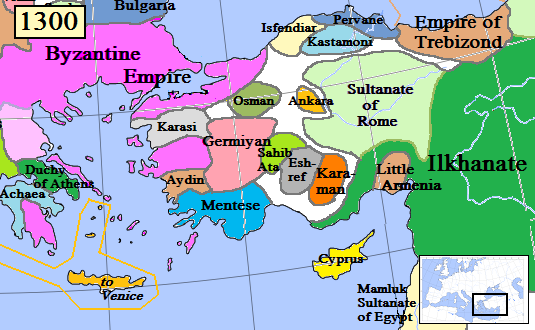Mesud II on:
[Wikipedia]
[Google]
[Amazon]
Ghiyath al-Dīn Me’sud ibn Kaykaus or Mesud II (, ''Ghiyāth ad-Dīn Mas'ūd bin Kaykāwūs''; , ) bore the title of Sultan of Rûm at various times between 1284 and 1308. He was a vassal of the
 Mesud was the eldest son of Kaykaus II. He spent part of his youth as an exile in the
Mesud was the eldest son of Kaykaus II. He spent part of his youth as an exile in the
Mongols
Mongols are an East Asian ethnic group native to Mongolia, China ( Inner Mongolia and other 11 autonomous territories), as well as the republics of Buryatia and Kalmykia in Russia. The Mongols are the principal member of the large family o ...
under Mahmud Ghazan and exercised no real authority. Mesud died in 1308, the last of the Seljuks of Rum.
Reign
 Mesud was the eldest son of Kaykaus II. He spent part of his youth as an exile in the
Mesud was the eldest son of Kaykaus II. He spent part of his youth as an exile in the Crimea
Crimea ( ) is a peninsula in Eastern Europe, on the northern coast of the Black Sea, almost entirely surrounded by the Black Sea and the smaller Sea of Azov. The Isthmus of Perekop connects the peninsula to Kherson Oblast in mainland Ukrain ...
and lived for a time in Constantinople
Constantinople (#Names of Constantinople, see other names) was a historical city located on the Bosporus that served as the capital of the Roman Empire, Roman, Byzantine Empire, Byzantine, Latin Empire, Latin, and Ottoman Empire, Ottoman empire ...
, then the capital of the Byzantine Empire
The Byzantine Empire, also known as the Eastern Roman Empire, was the continuation of the Roman Empire centred on Constantinople during late antiquity and the Middle Ages. Having survived History of the Roman Empire, the events that caused the ...
. He appears first in Anatolia
Anatolia (), also known as Asia Minor, is a peninsula in West Asia that makes up the majority of the land area of Turkey. It is the westernmost protrusion of Asia and is geographically bounded by the Mediterranean Sea to the south, the Aegean ...
in 1280 as a pretender to the throne. In 1284 the new Ilkhanid Sultan Ahmed Tekuder deposed and executed the Seljuq sultan Kaykhusraw III and installed Mesud in his place. Ahmad's successor, Arghun, divided the Seljuq lands and granted Konya and the western half of the kingdom to the deposed sultan's two young sons. Mesud invaded with a small force, had the two boys killed, and established himself in the city in 1286.
Mesud led several campaigns against the emerging Turkmen principalities, the Beyliks, always on behalf of the Mongols and usually with Mongol troops. Notable among these is the expedition beginning late in 1286 against the Germiyanids. The Germiyanids were a warlike band of Turkmen ancestry, settled by the Seljuqs a generation before in southwestern Anatolia to keep the more unruly Turkmen nomads in check. Mesud conducted the campaign under the tutelage of the vizier
A vizier (; ; ) is a high-ranking political advisor or Minister (government), minister in the Near East. The Abbasids, Abbasid caliphs gave the title ''wazir'' to a minister formerly called ''katib'' (secretary), who was at first merely a help ...
and elder statesman, Fakhr al-Din Ali. Though there were a few successes on the battlefield, the highly mobile Germiyanids remained a significant force in the region. Mesud and his Mongol allies conducted similarly futile expeditions against the Karamanids
The Karamanids ( or ), also known as the Emirate of Karaman and Beylik of Karaman (), was a Turkish people, Turkish Anatolian beyliks, Anatolian beylik (principality) of Salur tribe origin, descended from Oghuz Turks, centered in South-Centra ...
, Eshrefids and Ottomans
Ottoman may refer to:
* Osman I, historically known in English as "Ottoman I", founder of the Ottoman Empire
* Osman II, historically known in English as "Ottoman II"
* Ottoman Empire
The Ottoman Empire (), also called the Turkish Empir ...
.
In 1297 in an atmosphere characterized by intrigue and near constant revolt against the distant Ilkhan authority, both on the part of Mongol officers and local Turkoman potentates, the hapless Mesud was implicated in a plot against the Ilkhanate
The Ilkhanate or Il-khanate was a Mongol khanate founded in the southwestern territories of the Mongol Empire. It was ruled by the Il-Khans or Ilkhanids (), and known to the Mongols as ''Hülegü Ulus'' (). The Ilkhanid realm was officially known ...
. He was pardoned but deprived of his throne and confined in Tabriz
Tabriz (; ) is a city in the Central District (Tabriz County), Central District of Tabriz County, in the East Azerbaijan province, East Azerbaijan province of northwestern Iran. It serves as capital of the province, the county, and the distric ...
.Cahen, ''Pre-Ottoman Turkey'', p. 300 He was replaced with Kayqubad III who soon became involved in a similar plot and was executed by Mahmud Ghazan. The impoverished Mesud returned to the throne in 1303.Cahen, ''Pre-Ottoman Turkey'', p. 301
By 1308, Mesud was dead, the last member of the Seljuks of Rum.
According to Rustam Shukurov, Mesud II "had dual Christian and Muslim identity, an identity which was further complicated by dual Turkic/Persian and Greek ethnic identity".
Findings in 2015 propose his grave has been identified in Samsun
Samsun is a List of largest cities and towns in Turkey, city on the north coast of Turkey and a major Black Sea port. The urban area recorded a population of 738,692 in 2022. The city is the capital of Samsun Province which has a population of ...
.
References
Sources
* *183 *External links
* {{DEFAULTSORT:Mesud 02 13th-century births 14th-century deaths Pardon recipients 13th-century sultans of Rum